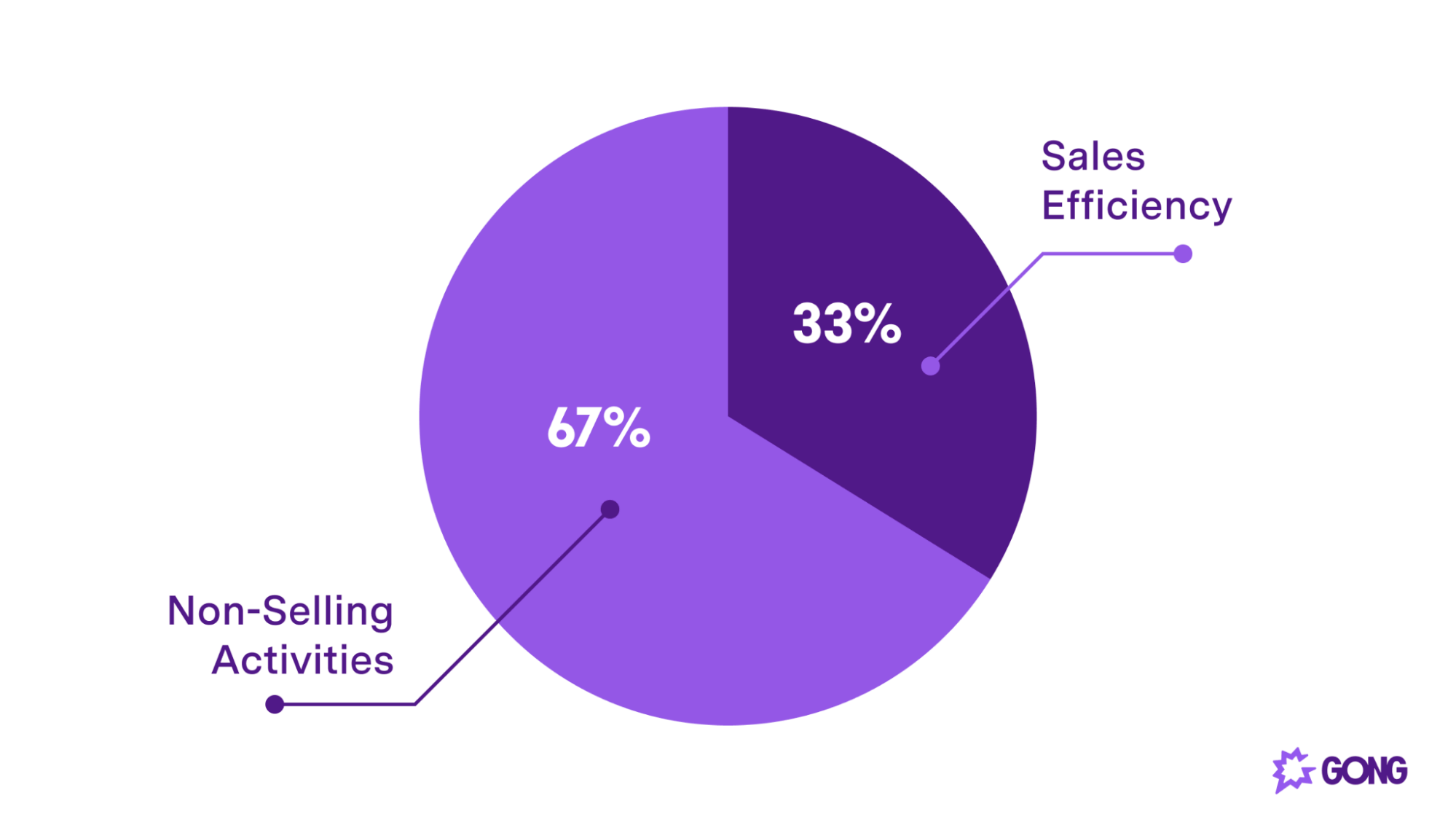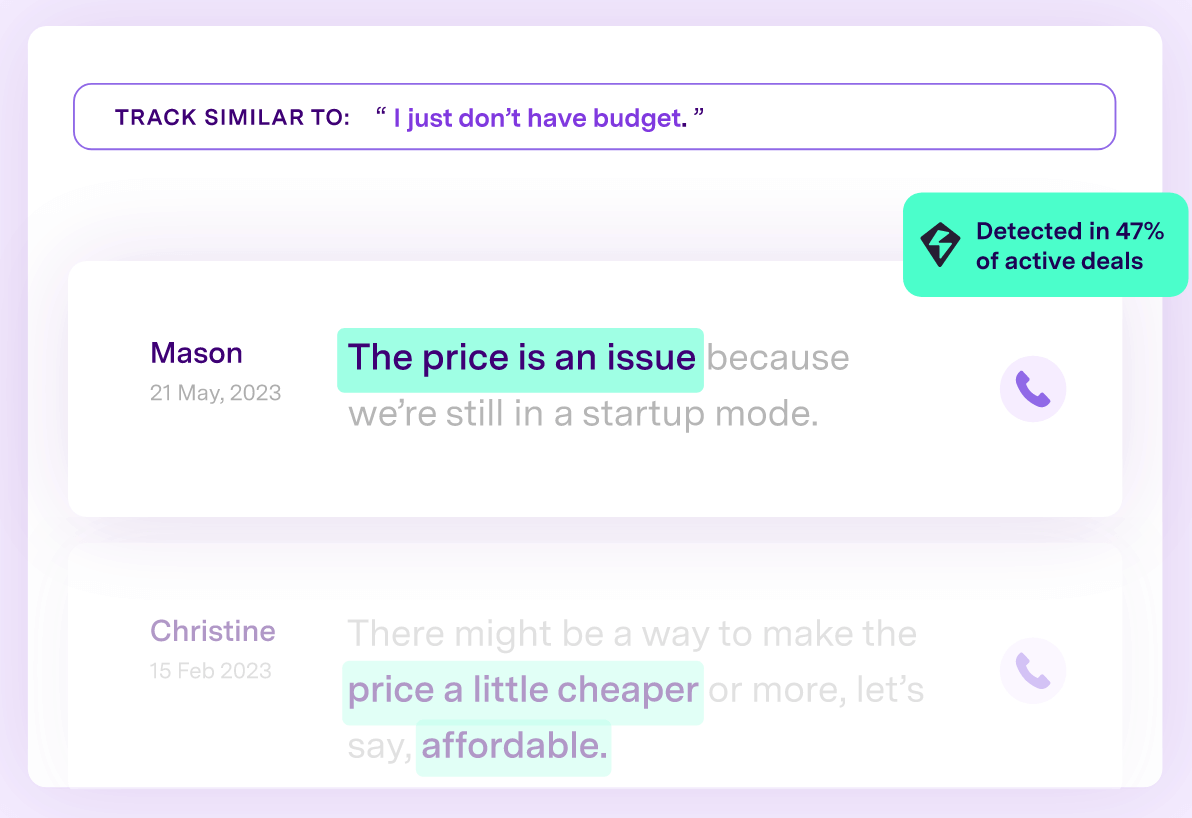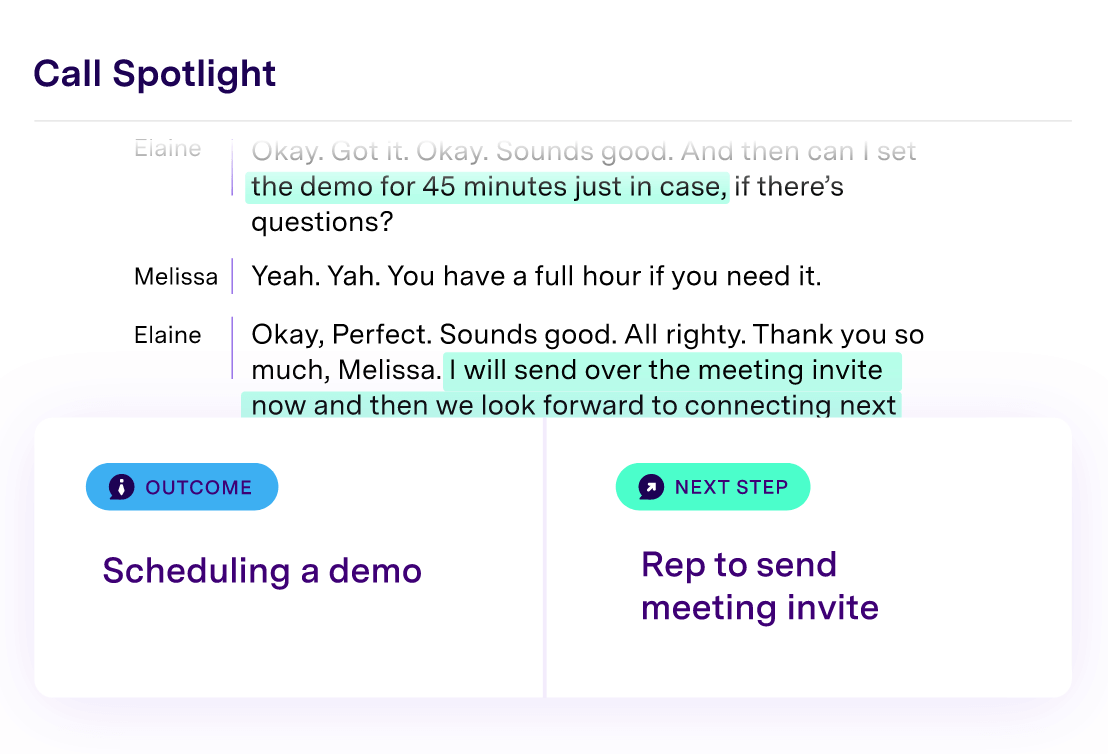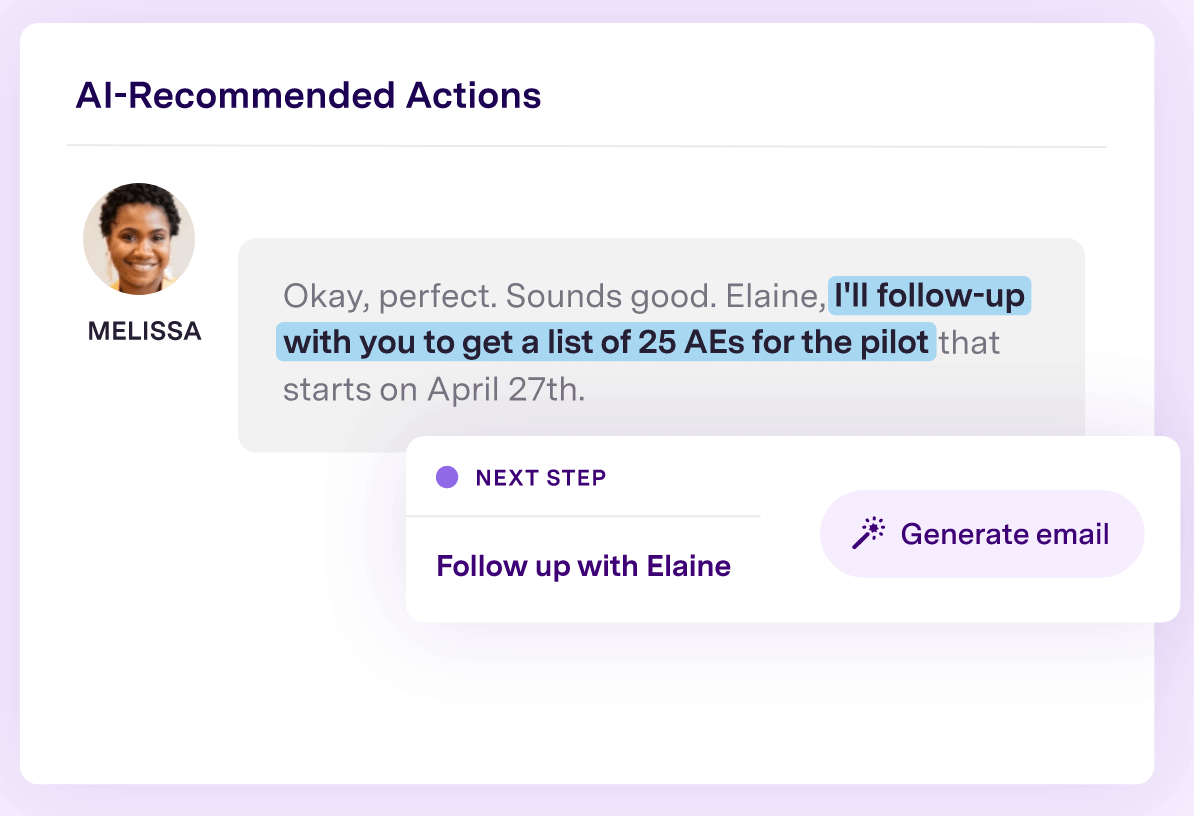How to use predictive AI to transform your sales team
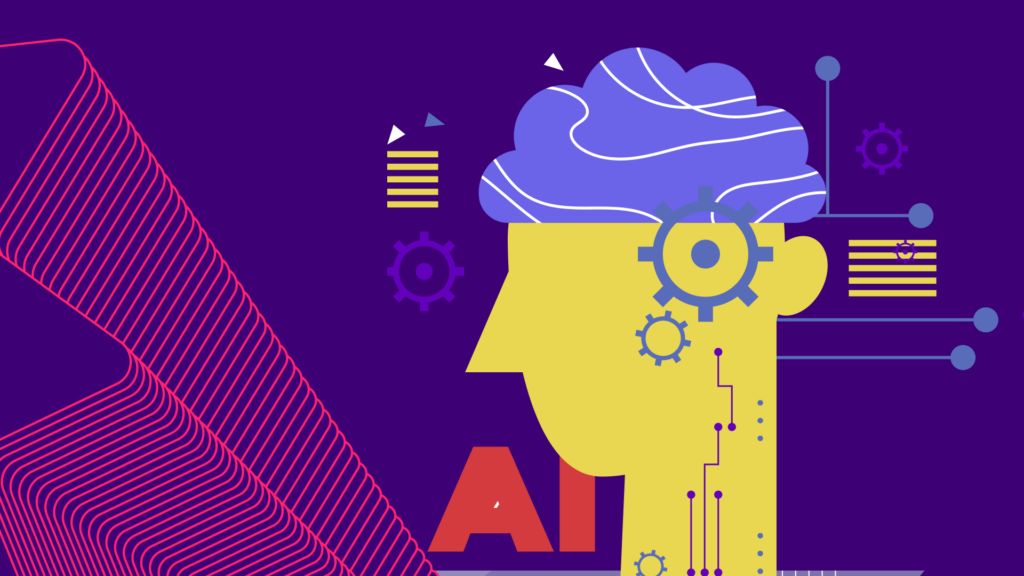
Sales reps are no strangers to performance and productivity-related tools. From CRMs to sales engagement software, these solutions allow reps to do their job better.
But there’s one technology that has the potential to blow every other piece of software out of the water: predictive AI. With predictive AI, sales teams can understand winning behavior, prioritize leads, and all but ensure success.
In this article, we’ll explain what predictive AI looks like in a sales environment, why it’s so important to sales teams, and four ways your team can use this technology.
What is predictive AI in sales
Predictive AI is a form of artificial intelligence and predictive analytics that aims to predict future events and outcomes by analyzing data sets. A predictive AI sales tool will analyze historical data such as sales conversations, buyer behavior, and customer experiences to spot patterns, generate insights, and predict future outcomes that sales reps, managers, and leaders can use to improve their performance.
We’re not talking about small data sets here. AI models can process mountains of data, a company’s entire history of sales, to gain insights into behaviors and buying habits.
Here’s an example:
A sales team employs a predictive AI model that analyzes historical sales data to see which prospects in the company’s pipeline are most likely to buy. The sales rep can use the information to prioritize those accounts with a high propensity to buy and increase their close rates. Sales leaders can use that data to forecast future revenue more accurately, and marketing leaders can use that data to target potential buyers with the same characteristics.
Predictive AI vs. generative AI
Let’s clear up any potential confusion around predictive AI vs. generative AI before we go further. Yes, they are both forms of artificial intelligence, but they are two distinct approaches. Predictive AI analyzes patterns in historical data sets to predict future events accurately.
Generative AI doesn’t make predictions. These models (usually natural language processing models) are built to create new and novel content, whether that’s writing, images, or something else entirely. Generative AI tools still need training data, but they aim to create something new that isn’t in existing data sets — rather than predicting how that data may change.
Why do sales teams need predictive AI?
AI isn’t going to replace your sales reps (more on that below), but it certainly can make them more productive. And that’s a good thing.
Not nearly enough of a sales rep’s time is spent selling. In fact, over two-thirds of the day is spent on non-selling activities.
But predictive AI can change that. By helping reps to work smarter rather than harder, reps can free up valuable time to do things that an AI can’t — like nurturing prospects or closing deals. In fact, AI is expected to improve employee productivity by as much as 40%.
Predictive AI also eliminates the risk of human error — especially regarding sales planning and forecasting. I’m sure you are a diligent and experienced sales leader, but everyone makes mistakes — except AI, of course.
Better still, AI models can analyze heaps more data than the hardest-working sales leader, meaning their predictions have a much better chance of being accurate.
Ultimately, it’s about not getting left behind. Research shows that high-performing sales teams are 1.9 times more likely to use AI than underperformers. Such is the power and accuracy of AI that these teams will begin to outperform their non-AI-adopting counterparts comfortably.
Given all that, it’s no wonder that the AI market will be worth almost $2 trillion by 2030.
What makes a good predictive AI
Several things separate great predictive AI sales tools from their mediocre counterparts. The first is that they are built specifically for sales and revenue teams. Gong’s AI, for instance, is built on billions of high-quality sales interactions and gets even smarter when you feed it your team’s data. While any predictive AI model can be trained on sales data, there’s simply no replacement for a model designed to use sales-specific data.
The second is that machine learning and complex algorithms understand context rather than keywords. Predictive AI models need to understand the full context of sales conversations rather than cherry-picking keywords that may or may not make sense in isolation to make accurate predictions and generate genuine business insights.
Finally, good predictive AI models should be customizable. These models are only really useful when they can be tailored to your business’s unique situation and needs, regardless of your size or location. Every sales organization and revenue team is different, and every predictive AI model should be slightly different.
4 ways your sales team can use predictive AI
There are many ways sales and revenue teams can use predictive AI in their day-to-day work. Here are four of the most popular methods:
Uncover trends
It’s one thing to understand data like customer behavior and sales conversations — it’s another thing entirely to generate actionable insights from it that you can act on. This is where predictive AI shines.
By analyzing mountains of sales data, Machine learning models can uncover trends that sales reps or leaders either can’t see quickly enough or won’t be able to spot at all. That could be the specific variables that lead to more closed-won deals or the specific actions that top performers take compared to the rest of your salesforce.
From there, it’s easy to turn these trends into actionable insights that can be used across the customer journey, from improving marketing campaigns to improving rep performance to achieving other business goals.
Improve performance
Most B2B deals require a lot of back-and-forth communication. Deals can get so complicated that it’s unclear what action a rep should take next. Should they pick up the phone and speak to a stakeholder? Should they send an email? Book a demo?
When the slightest misstep can jeopardize a deal, choosing the right action is vital. Enter predictive AI that can analyze the sentiment from conversations and combine it with historical data to suggest the best next steps to each rep.
As you can see in the image above, Gong’s AI has analyzed the conversation to understand a potential outcome and suggests the next steps a rep should take.
The result?
Sales reps spend more time taking the action that moves deals forward and less time worrying about what they should be doing next.
Increase rep productivity
Predictive AI isn’t limited to suggesting the next best steps for reps to take. In many cases, it can handle much of the heavy lifting, too. Predictive AI software can use historical data analysis to work out which sales messages are most likely to resonate and then craft those messages on behalf of the rep. All they need to do is review the email or LinkedIn message and hit send.
This kind of boost in productivity is already happening. Statistics show that 61% of workers say that their adoption of AI within the workplace has led to a boost in productivity.
Predictive AI can also help sales leaders empower reps to become more productive. By more accurately analyzing past performance and forecasting future performance, a predictive AI tool can help leaders set sales targets that reps are likely to achieve.
In some cases, that may mean pushing successful reps beyond what they thought was possible. In others, it may mean reducing targets so that under-performing reps get a taste of success. In either case, reps are happy, motivated, and more likely to go above and beyond to propel the company forward.
Scoring leads
The last thing you want your reps to do is waste time on leads that aren’t going to convert. You’d think those leads would be easy to spot, but that’s not always the case. Even if a lead shares all of the characteristics of a recently closed deal, there could be one tiny issue that a rep can’t spot until it’s too late.
But where sales reps fail, predictive AI can succeed.
A predictive AI-powered lead scoring system can accurately estimate the likelihood of every prospect in your pipeline converting. It can assign a score to each lead and then prioritize them accordingly, ensuring reps spend as much time as possible speaking to the prospects most likely to convert.
From a sales manager’s perspective, this use case can also highlight issues with your sales pipeline. For example, maybe a large percentage of prospects in a certain geographic area or from a particular referral source are rated the least likely to convert. A predictive AI can highlight these discrepancies and allow sales leaders to shift tactics accordingly.
Forecast sales
Predictive AI can significantly improve the accuracy of your sales forecasts. AI-powered sales solutions can draw on a much wider range of data if they are integrated with the rest of your sales tech stack and use more sophisticated models to give a much clearer view of your potential future sales.
It’s not just accuracy where predictive AI supersedes other solutions; it’s also speed. In many cases, forecasts can happen routinely and automatically without any intervention from sales managers. Everything happens in the background, and all sales managers or VPs of sales need to look at a dashboard or a report.
In turn, this allows sales leaders to make much faster decisions
Will predictive AI replace salespeople?
There may come a day when salespeople are replaced by AI. But it won’t be any time soon. The truth is that while predictive AI is much better than sales reps at many things — like analyzing historical data and predicting future performance — it pales in comparison to a sales rep when it comes to communicating with other humans.
The sales profession centers around human-to-human contact. The most valuable parts of the job require reps to understand their customers, anticipate their needs, and solve their problems. Even if an AI can tell a rep what they should do, it will never be able to build the rapport needed to turn a B2B relationship into a deal.
But that doesn’t mean sales reps should ignore or shun predictive AI. The truth is that the future of sales is one where sales reps and AI models work together hand in hand. Sales reps should take advantage of the many opportunities that AI brings, allowing predictive models to handle as many non-selling activities as possible while they focus on building and nurturing relationships with buyers.
Unleash predictive AI with Gong
Revenue teams can use predictive AI to improve almost every part of their operations. From making reps more productive to improving sales forecasts.
But not just any predictive AI tool will do. When revenue teams want to generate genuinely actionable insights relevant to their business, they turn to Gong.
Unlike other off-the-shelf AI tools, our technology is purpose-built for revenue teams and can be tailored to your business. Gong boasts over 40 AI models built on sales-specific data sets. That makes it the best way for sales teams to make smarter, faster decisions.
Ready to learn more? Get a demo with a product expert and see Gong AI in action.
